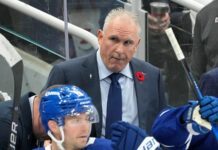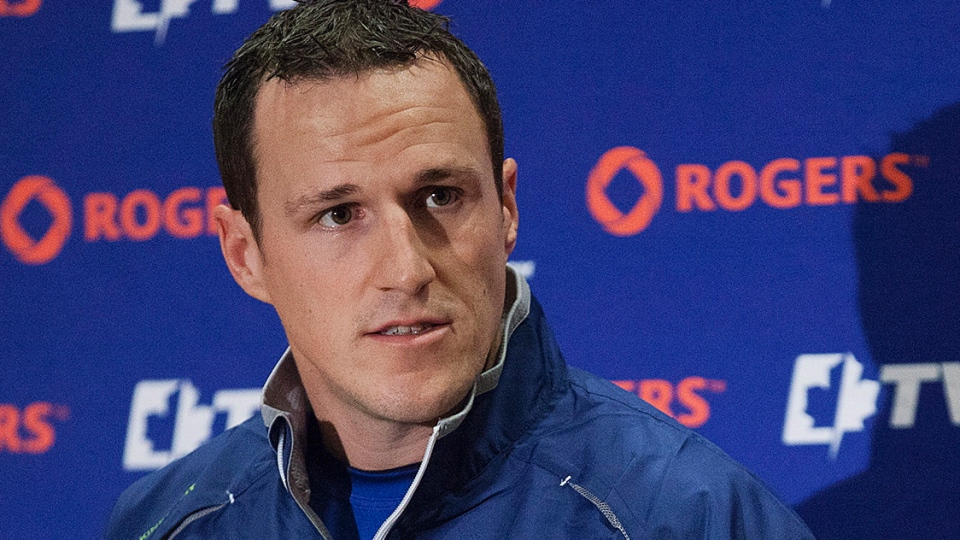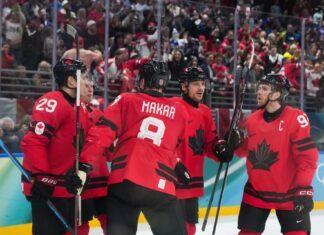Lou Lamoriello joined Prime Time Sports moments ago to discuss the Dion Phaneuf trade. Transcription below.
Both you and your head coach had praise for Dion Phaneuf prior to this deal. You weren’t reluctant to do so, and I’m not suggesting for a second that it was manipulative and that it was anything but deserved on your part, but the consensus seems to be that this was a move that was almost an inevitability. As soon as you could make it, you were going to make it. Is that true?
Lou Lamoriello: I wouldn’t say that’s true. I think the opportunity came about where we could make a move like this, but as far as actively looking at it, trying to do it – at this time, no, that wasn’t the case. It came about through a conversation about a different player, actually, but I want to go back to what you said about Mike and I praising Dion. He deserved every bit of that. He was exemplary from my dealings with him with how he handled many different situations that the media are not aware of, and the way he committed himself to the organization. Anything that was said I can assure you is what transpired. So he deserves that, and I also told him that myself when I told him about the trade. I wouldn’t want that to be misinterpreted in any way.
Beyond trading your captain, what jumped out to a lot of people is that you traded within the division. The Leafs and the Sens have had a lot of battles over the years. I’m wondering, from your perspective, what it was like dealing with Bryan Murray on this deal. You’re the two most veteran GMs in the League. How did that go?
Lamoriello: I think it certainly helped. Bryan and I had made transactions prior. We made a reasonably big transaction when he was in Anaheim that I think helped both clubs at that time. Our conversations over the years have always been extremely professional. I’ve known Bryan a long time, even prior to me coming into the League. You just have these conversations. You’re very honest; you’re up front. There is no, “who is trying to get the best [of the other]?” It’s just if someone is looking for a player, and you feel it’s the right thing for your organization, you try and make it work. You have to look at it through your own eyes of your own organization, not through the eyes of the other. Whatever the transaction is, it has to be good for you.
Was clearing cap space, albeit not right way but in the near future, paramount to you?
Lamoriello: Absolutely. I think the length of Dion’s contract and how far it went out at Dion’s age, I think all of that was taken into consideration. There’s no question about that. I think that we don’t know where the cap will go. We know exactly what the cap will be as far as Dion’s. We also know it would’ve hurt our hockey team today taking a top-four defenceman out of your lineup and not replacing him with a top-four defenceman. We knew that would be a situation that wouldn’t be good today. With the plan that we had, with the focus we have, we’re doing things for today but we’re not losing sight of what tomorrow is. At different times, maybe tomorrow takes a priority over today.
With the Canadian dollar where it’s at and some of the other factors around the League, do you forecast that the cap might not go up very much?
Lamoriello: I didn’t forecast it. I’m reading like everybody else is until we hear it. I think that the importance of the Canadian teams and the amount of revenue that they put into the NHL should be a concern of everyone.
Nobody sits down and says, “let’s make a ten-player deal. You take five and I take five, let’s pick some names.” It doesn’t work that way, but I’ve talked to GMs over my history about when multiple-player deals like this are made. You mentioned the conversation originally wasn’t about Dion Phaneuf. He was not the centerpiece of the discussion. It reminds me of almost every other multiple-player deal I’ve ever heard of. There’s almost a revolving door of names that are thrown out until you get to some point. I don’t know how much you will tell us about it, but give us the genesis of the conversation. How do you get from “let’s talk about a trade” to ten guys?
Lamoriello: I think you know me well enough to know we aren’t going to get into names. What transpires, simplistically, is that there might be a player asked about. “Okay, we will consider that.” And then that appears not to work, so, “how about this player? This is a need.” Then you say, “well, what would you give for that player?” In other words, you get curious now, even though that’s not the player you’re thinking of doing it for. That’s how the conversation starts, and then before you know it there are other situations that come in. Certainly the number of contracts that you’re giving up, you have to give the same number back or more. There’s so many variables involved to try to make the deal palatable for both sides. Sometimes there are little ingredients that make it go or not go. It’s just the way it works out. Somebody gets a little greedy, you walk away.
I’ve seen two reports – one that suggested that this deal has been worked on for at least a month, and another that the conversations were only started on Saturday and were concluded two days later. Which of those is true?
Lamoriello: The latter. This has not been worked on for a month.
This came together fairly quickly. Is that normal?
Lamoriello: I don’t know what’s normal or not. I think that when you focus in on a deal and you make a decision of whether we’ll get this done or not… in my opinion, if you’re talking about the player we’re talking about and you have the respect you have for him, we certainly wouldn’t want his name out there that such a thing was even being thought of. I don’t like that. I think that you have to respect the player. If this was going to happen after the initial conversation, it had to happen when it did – in a very short period of time.
Earlier today, Bryan Murray was on Hockey Central and mentioned there had to be some cajoling for Milan Michalek to get his mind around this. Did you get involved with that, first of all, with the player? Secondly, what kind of opportunity do you use for him now that he’s a Maple Leaf?
Lamoriello: Yes, I did. He had the right to negate because of his no-trade limitations. Bryan had given permission for me to speak to him. Yes, both I and Mike had a very brief conversations with him.
Do you have that conversation before the deal is actually consummated?
Lamoriello: In this case, we did.
You’d almost have to, wouldn’t you? Because if he rejects the deal, as I guess is his right, I’m not suggesting the deal would’ve come undone but you would’ve had to replace that player, correct?
Lamoriello: Yes.















![John Gruden after the Leafs prospects’ 4-1 win over Montreal: “[Vyacheslav Peksa] looked really comfortable in the net… We wouldn’t have won without him” John Gruden, head coach of the Toronto Marlies](https://mapleleafshotstove.com/wp-content/uploads/2025/09/gruden-post-game-sep-14-218x150.jpg)


















